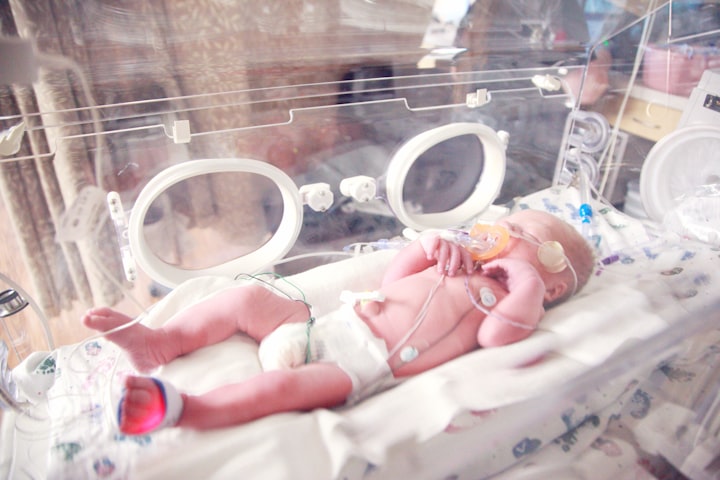When Spring Lives in an Incubator
Here are the 5 keys to an optimal life- lessons learned from working with the youngest people on Earth.

It’s Monday morning, and the sound of bells ringing greet me as I walk onto the unit. While there can be quiet days, neonatal intensive care is rarely silent. Nursing handover ends by 7:30am, and at 8:00am tired eyes and expert hands begin the process of feeding their charges. Soft cries from each passing incubator bring a smile to my face; soon, lovelies, your tummies will be full.
My eyelids threaten to migrate south as I stifle a yawn behind my blue medical mask. The clocks jumped forward but forgot to take our circadian rhythms with them. All except our patients, who don’t have any to speak of. For a moment, I am envious of their innocence.
Since medical school, I have been awed by human resiliency. Our bodies can create and sustain life not just once, but multiple times over. The womb, often depicted with leaves and flowers, is Spring-incarnate. And just like the seasons, pregnancy occurs both predictably and unexpectedly.
I pause in front of the resident workroom door. Life in the NICU has taught me many things, more than medicine, more than science. Miracles happen here every day, and not a single moment can be taken for granted. Now, I have one less hour in the day to dedicate not only to my patients but to myself.
What lessons can the NICU teach us? There are far too many to list here. Instead, let me share the lessons that can help us Spring forward and organize our lives.
Make the most out of the space you have.

The NICU is a large place that sometimes feels like rooms within rooms. It’s easy to feel confined in a space filled with incubators, monitors, ventilators, mobile computer stations and chairs galore. It is important to keep the unit orderly and tidy to ensure health care workers can easily access each patient and their families. The large windows help, even if the tall buildings across from us block much of the natural light. At night, the moon and stars shine brightly on cloudless nights.
Everything in the unit has its place, its purpose, its value. This is the lesson I carried with me to guide my Spring-cleaning spree at home. Hoodies from high school I haven’t worn in years? Donation bin. Broken toaster kept on the kitchen counter for sentimental value? Electronic disposal. Decades old textbooks borrowed from your parents when you were a kid? Excellent supports for my home office computer screen.
Within the day, my personal space was decluttered and repurposed. I also keep the curtains open at night to see the stars that remind me of my patients.
Cleanliness as the key to success.

The number one way to prevent infections is by effective handwashing. This is especially true in a unit where babies are so close together and thrive in small spaces. Some days, it feels like we go through litres of hand sanitizer, especially during the pandemic. Not only that, but we must ensure our scrubs, shoes and headbands are washed every day when we come home from work to protect ourselves and the babies. The unit itself is cleaned by environmental services every single day, an integral part of the ritual daily activities of the NICU.
In my own life, I exist in a two-bedroom apartment with my partner that is easy enough to keep clean (in theory). When things get busy, it becomes more difficult maintaining those good habits; vacuuming biweekly, mopping weekly, top to bottom deep cleans once per month… My time on the unit has me committing to these tasks no matter how many hours I work that week. These rituals can help keep us focused and mindful of our surroundings.
Stay connected to what matters to you.

Reorganization (or even just organization) depends on what truly matters to, what makes you tic. When you work long days on the floor, it’s easy to start believing there is little to do outside of the hospital. Therefore, I am a big supporter of mindfulness breaks, for hospital staff and families alike. Mindfulness allows me to take a pause during the day and focus my attention inward. Whether I invest 2 minutes or 15 minutes, my practice allows me to re-connect to thoughts and values that ground me, a form of internal Spring-cleaning I can do independent of the season.
This is a lesson I learned from the families we work with in the NICU. They are the epitome of strength and resilience, and our conversations, however brief, always leave me feeling fuller than I did moments prior.
Nurture yourself in quality, not only quantity.

Nutrition is a key component of care for our neonatal patients. Often, our babies need an extra boost to help them grow, and we ensure they are receiving the best recipe of breast milk and/or formula for a balanced intake. Our NICU dietitian is a staunch advocate for quality nutrition and supplementation of these infants and reminds us of this every single day during rounds.
As an adult, I can only grow horizontally. As such, I have reaffirmed my desire to diversify my meal plan this Spring and include more leafy greens, more vegetables, and less sweets (although some sweets are allowed!). I noticed I have started feeling more alert, less tired, and recover quicker after workouts since making these changes. On top of it, it makes keeping my space tidy and organized more feasible! In addition, I bought myself a gigantic pink water bottle to encourage me to drink frequently during busy shifts. The nurses refer to it as my daily fluid bolus. It’s the talk of the hospital, but hey, it works!
Life is a team sport.

A physician cannot get through a single day of work without a multidisciplinary team. We rely on each other, our respective expertise, and experiences, as well as our collective love for our patients and their families. This is key to patient-centered care. It is also crucial in ensuring the work environment is safe and promotes wellness and resilience. I am privileged to see it every day when deciding the next steps in a patient’s care, or when we are resuscitating infants in need of extra help transitioning to extra-uterine life.
Of all the advice I must give, this may be the most important point. You can read all the tips and tricks on reorganizing your life, but the simplest hack is allowing other people to help you with this process. This can look different depending on your personal circumstances; I simply want to iterate you are not alone, you are never alone, and there’s always a way to inspire (or bribe) someone to helping you clean your garage or finish that DIY project for your room. You never know when you may need someone to lend you their power drill to install bedroom curtains.
***
A smile floats on my lips as I mentally contemplate this list. I always tell my junior learners how much the intricate organization of human development and utterly unpredictable range of pediatric presentations can teach us about ourselves. My NICU babies are certainly no exception. Every day I thank my patients and their families for the wisdom they share with me, and the variety of deep, sometimes mundane lessons I take home with me.
As for daylight savings… who needs that extra hour, anyway?
***
Like my writing? Check out my other pieces:
- Not As I Do, a short story
- Two Sides of Us, a brief take on love and astrology
Follow me on Instagram @echolima__ <3
About the Creator
Eleni Levreault
Full-time baby doc | Part-time writer | Full-time dreamer |
https://www.instagram.com/echolima__/






Comments
There are no comments for this story
Be the first to respond and start the conversation.